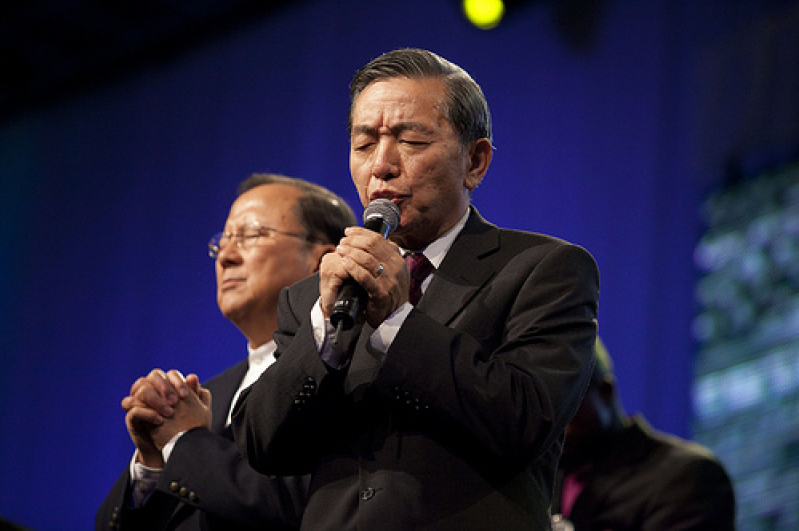
Dr. Philemon Choi Yuen Wan, member of Lausanne Congress Theology Working Group (TWG), president of Hong Kong Youth Foundation, and honorary chairman of Breakthrough Ministry Hong Kong, explained the theological themes of Lausanne III, the interaction between Lausanne and Africa and Asia, and the definition of the whole gospel through an interview with Hong Kong-based Christian Times last week.
Choi said this year’s conference features many youth leaders, in particular, those in the media fields. One of the reason is because at the Lausanne Young Leaders Conference they’ve intentionally seek out many excellent young evangelical leaders in every nation, who are around their 40s, including those from mainland China, who are new characters.
Choi complimented Dr. Chris Wright, chair of TWG and international ministries director for John Stott’s Langham Partnership, on his ways of doing things, which really touched him. Not only did Wright call upon western leaders in theology, but he also called many from Eastern Europe, Asia, and Africa, he said. Wright discovered that many of the theology leaders in developing nations who were trained under John Stott in the past now holds PhD degrees from very influential seminaries and are very young. Every time the TWF held their meetings, it would be a multiple-day retreat, where they’ve studied on three topics: whole gospel, whole church, and whole world.
Although Choi emphasized the importance of these three subjects. On the definition of whole church, actually it is very fragmented. This is not the real situation, since most leaders are westerners, and at most times the only the clergies are leading. Although the concepts of market place theology and lay leadership were often preached, they are not practiced.
Speaking of whole world, he also pointed out its incompleteness, whether it is looking through the perspectives of economy, geography, and politics. He asked of how can Christians define the whole world and what is the relationship between the whole world and the gospel.
Quoting Wright, Choi hopes this gathering won’t just be an ordinary gathering, but as Wright puts it, a “reformation”. While this is a very strong word, he said that he also has this hope that this gathering won't be just a celebration, but a meeting of renewal and reform on the key issues on hand.
While most people have narrowly defined the gospel to just evangelism, going to church, entering heaven, Choi stated that this diminishes the original meaning of the “Gospel/Good News”. The Lausanne organizers selected South Africa to hold the third Lausanne conference for a profound reason, he said. In South Africa, problems such as poverty, AIDS, ethnic conflicts, and others can be easily spotted, but Bishop Desmond Tutu like Mandela, who is an excellent political and spiritual leader of the country and Christian, has clearly enacted his faith in dealing with the problems of poverty, nation, and ethnic conflicts.
Then, Choi spoke about the definition of missions. What kind of role do Christians enact in “public space” and the “market place”? He said currently most who engage in discussion in these topics are mostly clergymen or full-time missionaries; of the 30 people participating in this year’s conference from Hong Kong are mostly pastoral workers. He hopes that in the future more regular believers can participate and discuss the relevant topics. The church must not simply categorize full-time pastoral workers as holy and regular believers as secular, but should view all people as priests.
Chinese churches have traditionally focused on training of piety; they don’t step into politics, so church and state are very much segregated, he said. Although we call ourselves evangelicals, we also tend to be narrow-minded when defining the gospel – tend to be more conservative in social concerns, poverty, and social justice. Only a few organizations and individuals are doing this, so it has not become a mainstream.
Lastly, Choi explained the meaning of global topics to average believers. He said some are called to be seminary professors, pastoral workers, which are all needed, but speaking of “saints”, of whom he is one of them, he is neither a pastor, nor a seminary professor. He has always focused on one thing – working with the youth; whether in working with the government or going to China, his work is all related to youth policies.
He discovered that his work is very important, because professionalism and “content” is needed in public space platforms, where everything cannot be just spiritualized using the gospel. In his many years of work with youth, many needed employment, resolve poverty, mend broken families, which all need the synthesis of faith and professionalism.
Using Hong Kong churches and society as an example of illustration, he said that there is very serious problem in Hong Kong churches, and that is they are very introverted, discussing only introverted topics. As a result, the churches just cast all of the social problems to the government and businesses, since one has power and the other money. However, the existence of a society needs average people, average intellectuals with “content”.
“I feel that the mission of believers in the market place is most important in the future. Market place theology, being a witness in the market place, and the role that market place professionals should play in public place are all worth thinking about,” he concluded.
To view the entire interview, please click here







